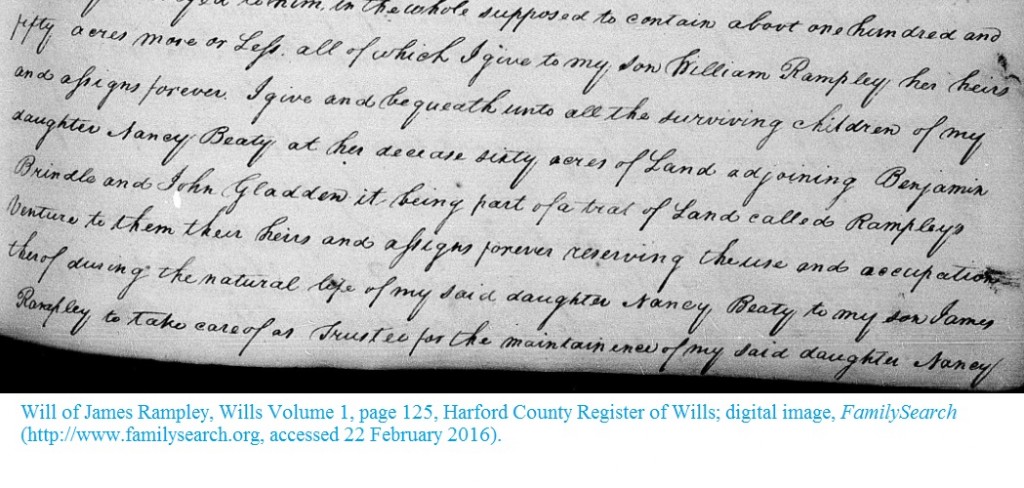Wills can hint at family squabbles. Researchers need to be careful and not overdramatize the family drama the will suggests. This 3 July 1812 will admitted to probate in Harford County, Maryland in September of 1817 suggests at some family tension. One just has to be careful about reading more into the document than it contains.
The will says in part:
I give and bequeath unto all the surviving children of my daughter Nancy Beaty at her decease sixty acres of Land adjoining Benjamin Brindle and John Gladden it being part of a tract of Land called Rampleys Venture to them their heirs assigns forever reserving the use and occupation thereof during the natural life of my said daughter Nancy Beaty to my son James Rampley to take care of as Trustee for the maintainance of my said daughter nancy and her Children until the decease of my said daughter Nancy Beaty my son in law John Beaty to have no claim Right or title to said land or the profits thereof.
James indicated that he had already given to another son-in-law real property that was to be for the benefit of two other grandchildren who are specifically named. That son-in-law was given permission to sell the property if he thought it was advantageous to do so as long as he gave security the local orphans’ court. John Beaty is treated differently. The question is why?
The answer is that it is difficult to say and we need to be careful drawing conclusions about James and John. What is clear is that James Rampley did not want John Beaty having control of the property that was intended for John’s wife, Nancy (Rampley) Beaty, and “her children.” In two separate places the will makes it clear that the property is to go to Nancy and her children. The use of that phrase does not necessarily mean that John other children besides those he had with Nancy, but it is possible.
There are several possibilities:
- John and James simply did not get along.
- John had children with a previous wife and this clause is to prevent those children from benefiting.
- James was concerned if something happened to Nancy that John would marry again.
- James did not trust John.
- John was having financial difficulties at the time the will was written.
These are not mutually exclusive scenarios and we’ll stop the list with these instead of creating a 1812 Harford County, Maryland, reality show.
All we know is that James had a reason for treating the Beatys differently in his will. Other records may shed light on some of these theories.
The researcher should use the theories to contemplate what additional records to search and should not indicate that these theories are reasonably established. I would use them in my research notes and no where else.
Because that’s how theories become facts. The fact in this will is that James apparently had a reason to treat John Beaty differently.
That should be used to drive our research further—not write an undocumented soap opera.



No responses yet